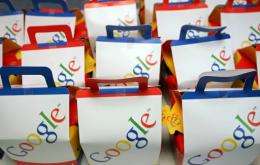Google on Tuesday said it will soon begin selling electronic books that people can read on any Internet-connected device including Apple's hot-selling iPad tablet computers.
Google on Tuesday said it will soon begin selling electronic books that people can read on any Internet-connected device including Apple's hot-selling iPad tablet computers.
Google will launch an Editions online digital book shop by the end of July and its virtual shelves will be stocked with in-print works with the permission of publishers owning copyrights.
"This e-book service will be device agnostic," Google spokesman Gabriel Stricker told AFP.
Books bought from Google and its partners would be available to any device that has a web browser, from smart phones and the growing number of e-book readers to personal computers.
Google books will be able to be read by Kindle readers but will also support the "epub" open standard format backed by the International Digital Publishing Forum and which many publishers now use.
The California-based Internet giant in 2006 invited publishers to sell books for reading online. Advances in Web browser technology since then have made the plan feasible.
Editions is separate from a controversial Google Book Search project to make all the world's written works, including out-of-print titles, available online.
The move brings another heavyweight contender to the increasingly competitive electronic books market. Apple and Amazon each run online digital book shops.
Apple has sold more than a million iPads since it began selling Wi-Fi models in the United States on April 3 and released 3G telecom network enabled models on Friday.
Amazon has been enhancing its Kindle digital book devices to take on iPad tablets, which boast electronic reading among an array of features.
Google is still awaiting a ruling by a US federal judge pondering the fate of a legal agreement with US authors and publishers that would clear the way for Book Search.
Google has dismissed the anti-trust and copyright concerns raised by the US Justice Department and opponents of the agreement and urged US District Court Judge Denny Chin to give it a green light.
(c) 2010 AFP























